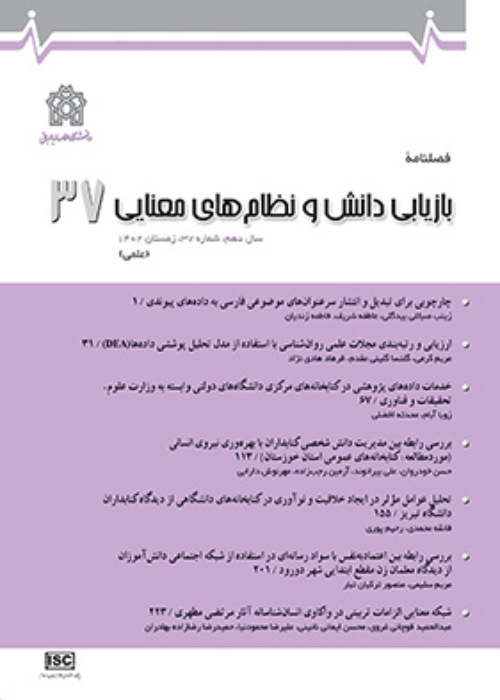Knowledge audit in Iranian university libraries with factor analysis approach
The increasing increase of knowledge as the most important source of competitive advantage in the current era in various scientific fields, especially in the field of business, on the one hand, and the selection of appropriate knowledge management strategies to achieve the goals of organizations, on the other hand, has doubled the importance of knowledge audit in today's competitive world. The goal of knowledge audit is to evaluate the knowledge management processes to match them with the organization's goals. So that they can organize their own obvious and existing knowledge well and extract the hidden knowledge of their employees and provide the necessary grounds to discover and identify gaps in the creation, organization, sharing and application of knowledge and the process of knowledge sharing and transfer. Accelerate in organizations. In academic environments, the understanding of the importance of knowledge as a critical source of knowledge audit for organizations is increasing. Knowledge creates a competitive advantage, and organizations that are not able to audit knowledge and use it correctly are doomed to failure in the field of competition. One of the tools that can help organizations in achieving these goals is knowledge audit. Academic libraries also use innovations, philosophies, strategies and techniques used in different sectors in search of achieving a sustainable competitive advantage and in the direction of creating strategic knowledge for strategic academic purposes. In this regard, university libraries can rely on knowledge audit strategies not only to be able to face changes, but also to have a preventive approach or to be the agent of change
Research Question(s):
the problem of the present research is, what are the dimensions, components and indicators of knowledge audit in Iranian academic libraries?
Literature Review:
Knowledge audit is a review, review, measurement and evaluation of the organization's intellectual assets that identifies how these assets are used. Knowledge audit specifies the organization's knowledge needs, the location of the organization's knowledge, how to use it, identifying the organization's knowledge obstacles and problems and providing methods to improve the organization's knowledge, which includes the following processes:Planning: In this stage, the goals, missions, missions, strategies, limitations and scope of the knowledge audit are determined.
Data collection: In this stage, data is collected based on the information of the previous stage through interviews, questionnaires, etc.
Data processing: In this step, valid and invalid data are identified and the accuracy and validity of the data is determined.
Data analysis: In this stage, after quantitative and qualitative data analysis, the value of knowledge capital, effectiveness and efficiency of knowledge management are evaluated.
Reporting: In this step, a report is presented on how the organization's knowledge flows, knowledge resources, problems and related limitations.
Summary: In this stage, the knowledge map of the organization is presented and solutions are suggested to improve the knowledge management of the organization (Jehani Freemani, 2015).
This research is of an applied type, which was carried out with the descriptive survey research method. The statistical population of this research includes the main managers and managers of central library departments of universities affiliated to the Ministry of Science, Research and Technology. The sampling method of the libraries was chosen according to their dispersion in the whole country, first by random cluster sampling and then by targeted sampling of the central library of the largest university in the capital of the province. 300 questionnaires were distributed among them, of which 279 questionnaires were answered.
Based on the findings of the organizational vision and goals research, data and knowledge analysis, explicit and implicit knowledge measurement, knowledge flow mapping, identifying strategic elements of the organization, analyzing the gap between existing and desirable knowledge, preparing the organization, identifying the knowledge audit process, forming Knowledge audit working group, knowledge flow analysis, identification of organization's valuable assets, information evaluation, current knowledge health measurement and knowledge application analysis are effective factors in knowledge audit. Based on the correlation matrix between research variables, there is a significant relationship between knowledge audit components at the level of 0.01.
The results of the structural equation model showed that the path coefficients are also positive and significant at the 0.01 level, which indicates their positive effect on knowledge audit in Iranian academic libraries.The tested model had an absolute fit index of GOF of 0.50, and the value obtained for this fit index indicates the appropriate fit of the tested model. Therefore, it can be said that the components of knowledge audit working group formation, knowledge flow analysis and current knowledge health measurement have a greater role in the knowledge audit of libraries.
The results showed that the status of knowledge audit components in the central library of Shahid Bahonar University of Kerman and the central library of Gilan University is higher than other libraries. In explaining the results of the research, it can be said that knowledge audit plays a very important role in supporting the knowledge needed by university libraries; Because it can examine how knowledge is transferred in libraries and its use inside and outside libraries, and after that, by identifying the weaknesses and strengths of libraries, it examines the gaps in them and by preventing Rework helps to manage and audit their knowledge effectively.
The purpose of the present research is to analyze the audit of knowledge in Iranian university libraries. Based on the results of the research, it was found that managers can benefit from knowledge audit in improving the quality of university library services. By applying knowledge audit, managers review, examine, measure and evaluate the intellectual assets of the organization and evaluate the knowledge reserves and flow of the entire organization.
- حق عضویت دریافتی صرف حمایت از نشریات عضو و نگهداری، تکمیل و توسعه مگیران میشود.
- پرداخت حق اشتراک و دانلود مقالات اجازه بازنشر آن در سایر رسانههای چاپی و دیجیتال را به کاربر نمیدهد.



